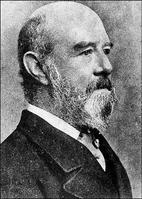Verene Shepherd, Contributor
Sir Anthony Musgrave
SIR ANTHONY and Lady Musgrave arrived in Jamaica in August 1877 and assumed duties on August 23, 1877. He replaced the unpopular Sir William Gray, who had been recalled by Lord Carnarvon and who relinquished office on March 10, 1877, and Lieutenant- Governor Edward E. Rushworth, CMG, who held the fort while Musgrave prepared to take office. Unfortunately, Rushworth died of yellow fever on August 10, 1877, leaving the administration of the Government to Major-General Mann, president of the Privy Council.
Musgrave arrived in Jamaica with prior 'knowledge' about the island, gleaned from 'information' circulating in the United Kingdom. This 'knowledge', decidedly anti the black working class, led him to believe that "there must be a great amount of irregularity, maladministration and waste to correct (in Jamaica), if there were nothing worse; and with my sympathies enlisted on behalf of the sugar-planting body, adversely to the Negro." His six-year stint would disabuse him of some of his prior 'knowledge' and his anti-black sentiments.
Colonial Office
He had much to learn about Jamaica, and so started off tentatively in his correspondence with the Colonial Office, simply sending covering letters without much personal comment, with enclosures dealing with routine matters of Government during his first few months.
But, he soon had to confront contentious issues and formulate policy towards them. For example, he had to deal with the matter of the cropping of women's hair in prisons and the damning report on the state of Jamaica that had appeared in the November 1876 issue of Fraser's Magazine and reprinted in the Standard Newspaper.
He also was confronted with two foreign affairs matters: the dispute between Jamaica and the Spanish government over the British ship Octavia that had been captured by a Spanish man-of-war and berthed in Puerto Rico, and the case of the Florence. Briefly, in September 1877, the Florence, laden with arms and ammunition, on a voyage from Colon to the island of St Thomas in the Virgin Islands, had been forced to put in at Port Royal, in a disabled condition.
It had offloaded its cargo (arms and ammunition) for storage at Fort Augusta, as required by Jamaican law, before proceeding to Kingston harbour to effect much-needed repairs. When the ship was ready to leave, the Jamaica authorities, suspicious of the arms on board and concerned about a possible arms trade to Jamaica, at first refused to release the cargo. This led to a lawsuit against the governor by the owners, for illegal detention and confiscation of its cargo. Jamaica was eventually fined for this action, causing much resentment from some sections of the population against the governor and the legislative council that approved the money.
Prison discipline
In terms of the cropping of women's hair, the Right Honourable the Earl of Carnarvon had recommended its discontinuation since 1876. But, apparently, there were elements in the Caribbean wanting its return in the name of prison discipline. Musgrave wrote to Carnarvon to ask him to revisit the question, based on the many appeals to him for the reintroduction of the practice.
On January 2, 1878, by which time he believed that he had become somewhat 'seasoned' to the local political and socio-economic climate, and had "sufficiently apprised himself of the issues facing Jamaica", Musgrave gave his first address to the Legislative Council. By then, on the instruction of the secretary of state who had been lobbied by the sugar planning interests, the Public Treasury had assumed the immigration debt, which stood at £174,923. Also transferred to the Public Treasury were the annual expenses for hospitals and the medical care of the immigrants.
General accounts
There was also a deficit of £4,063 in the general accounts in September 1877 and an anticipated deficit of £2,683 in the general accounts of the financial year 1877-78. Predictably, among his announcements was the reimposition of the cattle tax (abolished in 1870) to help to deal with the financial deficit. A loan of £35,000 was also to be raised under Law 1 of 1878. The duties on coffee and logwood went to the general revenue and no longer to the immigration fund; and the reduction of expenditure on public works and other economies meant that the year closed on a surplus.
Professor Verene Shepherd is president of the Association of Caribbean Historians.

